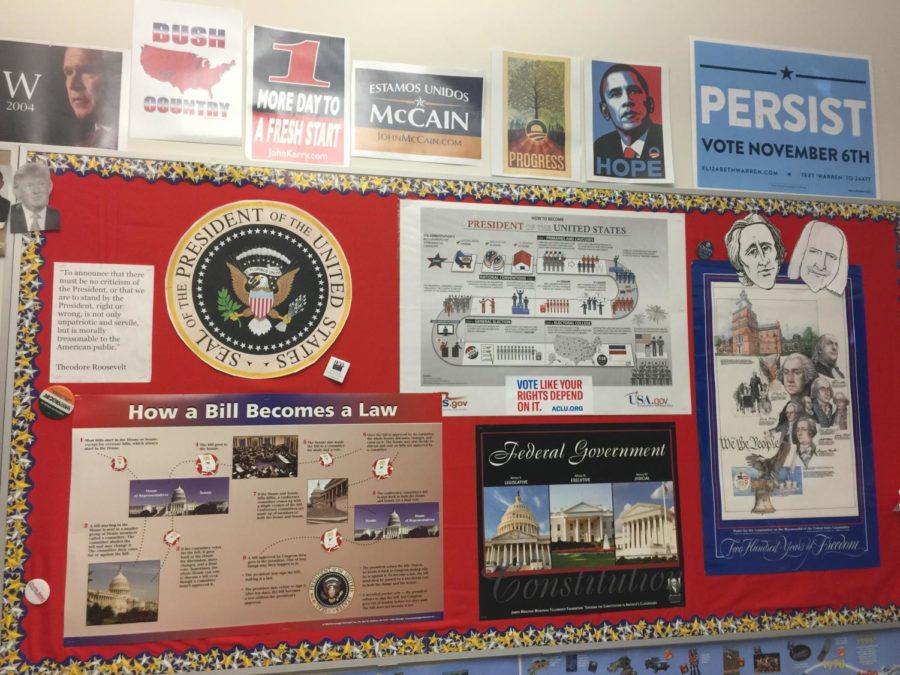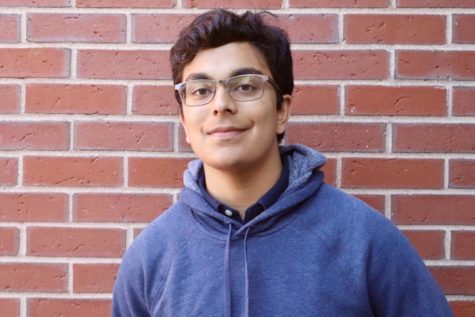Opinion: Political engagement – when opportunity becomes obligation
Credit: Atharva Weling
The political mural in room B242. WSPN’s Atharva Weling explores the rationale of politically apathetic students and the necessity of political engagement.
November 25, 2019
On July 1, 1971, the United States ratified the 26th Amendment to the Constitution, granting the right to vote to all American citizens who were 18 years or older. This momentous occasion was made possible by the Vietnam War and the government’s need for troops in their fight against the Viet Cong. Students that were subject to the draft argued that they were equally entitled to enfranchisement, and politicians eventually cracked.
Nearly 50 years later, students are once again coming to the forefront of American politics. President Trump has polarized our nation, and students of all kinds are coming out to make their voices heard. From his violent rhetoric with Iran to his potential overhaul of our healthcare system to his engagements in Ukraine – which some say undermine the foundation of our democracy and could result in his impeachment and removal from office – Trump’s actions determine the fate of our country, and teenagers on both sides of the aisle are letting their opinions on our commander-in-chief be known.
But while a sizable portion of our student body is quick to let the world know how it feels about our government’s status, for an equally significant portion, political engagement just doesn’t come as easily.
I first realized just how clueless and apathetic I was towards our country’s politics the moment I walked into school on the first day of eighth grade. The 2016 presidential election was the talk of the school. My classmates had adopted unrelenting positions on their preferred candidates, and it wasn’t uncommon in the weeks leading up to election day for heated debates to spring up in the hallways.
I was lost. I had some vague idea of who I thought was good or who I thought was bad, but as far as arguments over specific policies and events went, I was useless in the way of contributions. My understanding of the political scene was as basic as possible, and I found myself awash in a sea of raging emotions as tensions ran high over issues like immigration and gun restrictions, issues which I only understood in a vacuum. My knowledge of their beliefs was solely gleaned from snippets of the news I had glanced at while running out to catch the bus on Monday mornings.
Why was I not as ardently motivated by these candidate’s actions? Well, if I was already behind, how could I catch up? Every day that I didn’t know what had happened the day before, something radically new had happened. Especially after the election ended and President Trump’s policies came into full swing, it seemed as if there was never a moment for me to dive head-first into the political sphere. Every new development meant that the knowledge that I had thought would allow me to finally engage in civic discussions was irrelevant. I was petrified of looking stupid, so I avoided talking at all.
Other students may have a range of reasons for being unwilling to become politically engaged. Whether they lack the time to watch the news, don’t understand what’s going on or don’t want to get involved in a political scene as divided and violent as the one we are in now, they just cannot find a need nor a reason to care about what’s happening. But while our minds may not want to mature politically, our bodies are maturing in reality, and the power to decide what will happen to our country will be in our hands sooner than many of us realize.
The 2020 election is barely a year away, and while 2016 saw record low voter turnout, next year promises to bring a wave of previously uninterested voters, radicalized by the rhetoric that now pervades our nation. Students, as the future of America, have an obligation to join in on this surge in civic interest. Some of us will be eligible to vote, but the vast majority of students at WHS will remain under the age of 18 and unable to fulfill the same duty as our parents and older siblings.
But just because we are scared, or disinterested or unable to vote, we can and should take action. The past month has seen students make statements in a way that we haven’t seen since those 1971 high school protesters following the Vietnam War. There have been climate strikes organized, political clubs founded and opportunities for activism created. The resources are here, and we are significantly more fortunate than other students across the world with the amount of freedom we have at our age. It’s time we take advantage of it.
Opinion articles written by staff members represent their personal views. The opinions expressed do not necessarily represent WSPN as a publication.


























